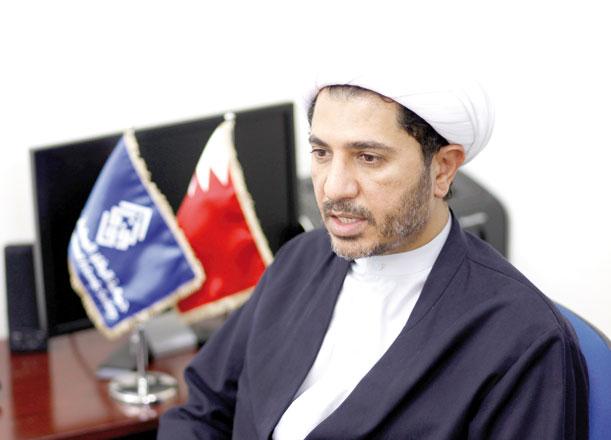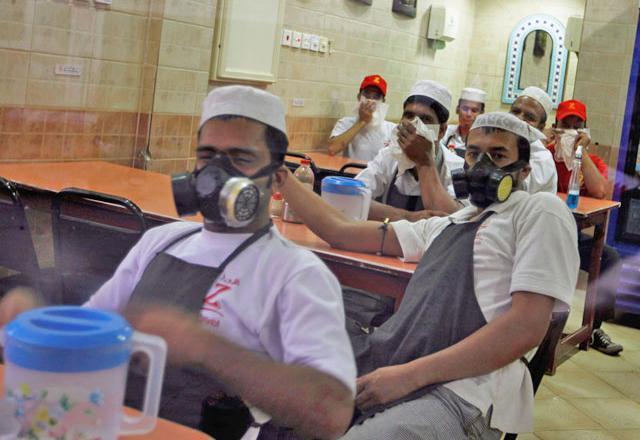You are here
Bahrain Shiite opposition leader loses appeal against life term
By AFP - Jan 28,2019 - Last updated at Jan 28,2019
DUBAI — Bahrain's supreme court upheld on Monday a life sentence for Shiite opposition leader Sheikh Ali Salman for spying for Gulf rival Qatar, a verdict Salman's party slammed as ‘‘political revenge’’.
Salman, who headed the Shiite Al Wefaq group, was convicted by an appeals court in November, in a ruling that rights groups called a travesty.
The supreme court confirmed the verdict against Salman and two of his aides for ‘‘spying for a foreign state in order to... overthrow the government’’, according to a statement released by public prosecutor Osama Al Awfi.
Bahrain in 2017 cut all ties with Qatar as part of a Saudi-led boycott, in response to what Riyadh and its allies say are Doha's policies on Iran and Islamist groups.
A tiny Gulf archipelago, allied with the US and located between regional rivals Saudi Arabia and Iran, the kingdom of Bahrain has been hit by waves of unrest since 2011, when security forces crushed Shiite-led protests demanding an elected prime minister.
Salman's opposition group, Al Wefaq, was dissolved by a court order in 2016. The cleric is currently serving a four-year sentence in a separate case on charges of ‘‘inciting hatred’’ in the kingdom.
Al Wefaq on Monday issued a statement slamming the verdict against Salman as ‘‘political revenge’’.
‘‘The majority of Bahrainis hold firm to the need to move from a tyrannical regime to a democracy,’’ the group said.
Salman's aides, Ali Al Aswad and Hassan Sultan, who had been sentenced to life in absentia, also lost their appeals Monday. Both men are former members of parliament and reside outside of Bahrain.
Qatar has repeatedly denied accusations of conspiring against Bahrain with Salman.
The Gulf diplomatic row is now in its second year. Doha has denied accusations it supports Iran and radical Islamist groups. Bahrain, Saudi Arabia and the United Arab Emirates have banned their citizens from travelling to Qatar.
Ruled for more than two centuries by the Sunni Al Khalifa dynasty, Bahrain has a majority Shiite Muslim population, according to unofficial estimates contested by the government.
Bahraini authorities accuse Tehran of inciting anti-government rallies and have said jailed protesters have been trained in, and armed by, Iran, which denies the allegations.
In addition to Al Wefaq, the kingdom has also banned the secular National Democratic Action Society, or Al Waad, over allegations of links to terrorists.
Both opposition groups are denied representation in parliament.
Human rights groups have frequently said cases against activists in Bahrain — men and women, religious and secular — fail to meet the basic standards of fair trials.
Bahraini activist Sayed Alwadaei, advocacy director for the London-based Bahrain Institute for Rights and Democracy, said Monday's verdict was ‘‘political revenge and an insult to justice’’.
Amnesty and Human Rights Watch have categorised Salman and other jailed opposition leaders as prisoners of conscience, slamming the initial sentencing against him and his aides as political reprisal.
Amnesty has called the verdict against Salman ‘‘a travesty of justice’’.
In June, Bahrain amended its law on political rights, prohibiting leaders and members of dissolved political associations from running in legislative elections.
The king last year signed off on a decree granting military courts the right to try civilians accused of ‘‘terrorism’’, a vague legal term.
Bahrain, a vital link for Western militaries, is home to the US Navy's Fifth Fleet, as well as a permanent British base.
US President Donald Trump has eased restrictions on arms sales to Bahrain since taking office.
Washington had urged Bahraini authorities not to overturn Salman's acquittal by a high criminal court in June of spying for Qatar, a verdict the public prosecution appealed.
Related Articles
DUBAI, United Arab Emirates — Bahrain's public prosecutor has appealed a court ruling that acquitted three senior leaders of the country's m
Detained Bahraini Shiite opposition chief Sheikh Ali Salman is suspected of inciting hatred and violence, a minister said, warning against any escalation in protests that saw supporters clashing with police Monday.
DUBAI — A Bahraini court ordered the suspension of the country’s main opposition group Al Wefaq on Tuesday, its lawyer said, in what appeare
















